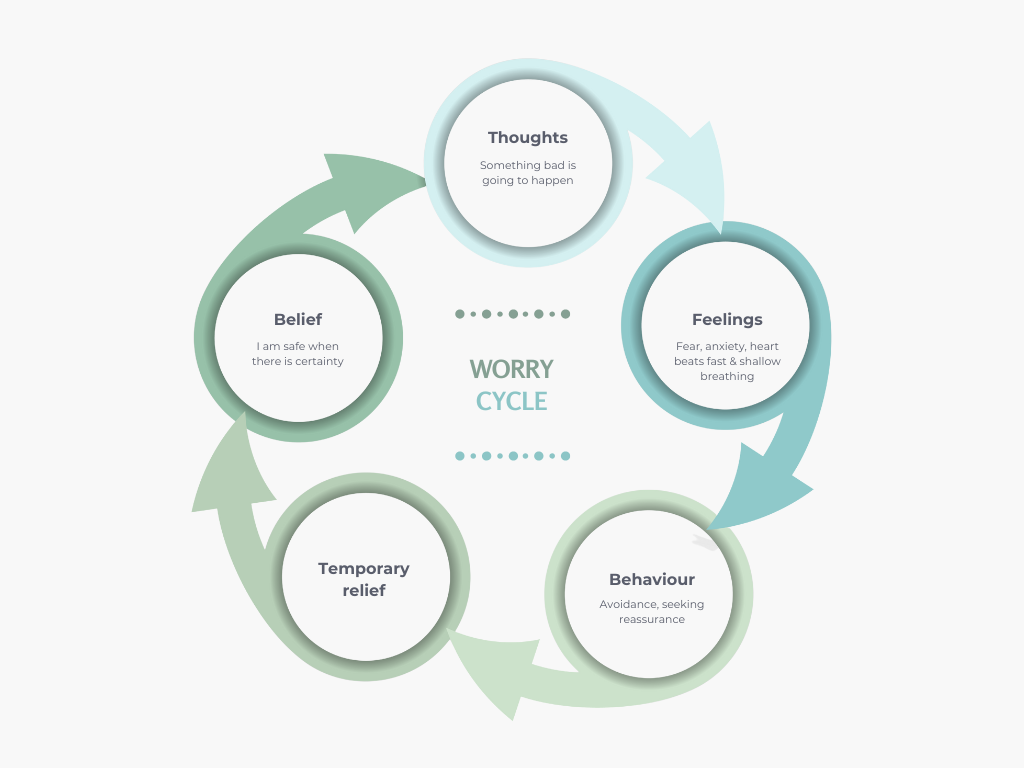
Written by Evangelia Botsaki, CBT and Trauma Focused Therapist: March 20, 2025
Understanding Anxiety and Ways to Overcome It
Feeling anxious is a natural response that we all experience throughout our lives. However, for some people, this feeling of anxiety becomes so overwhelming that it is difficult to control and impacts their everyday life. Understanding our own cognitive and behavioural patterns can help us develop tools to break the cycle of worry.
Cycle of Worry
Let’s explore the cycle of worry from a cognitive behavioural perspective using the example of someone who is afraid of flying. If they find themselves needing to travel by plane, worrisome thoughts may come to mind, such as “I will have a panic attack on the plane” or “the plane is going to crash”. These thoughts make them feel stressed, anxious, and afraid. As a result, they might avoid the trip. Initially, they might feel less anxious or relieved and think, “I am safe now”. The avoidance then acts as positive reinforcement (every time I avoid travelling by plane, I feel better instantly). This reinforces the belief that to be safe, I need to be certain that nothing bad will happen, and I need to avoid any instance of uncertainty. Intolerance to uncertainty feeds the avoidance and reassurance strategies, keeping us stuck in the cycle of worry (Dugas and Robichaud, 2007).
Cognitive Behavioural Therapy (CBT) uses a variety of techniques to reduce anxiety. Keeping a journal or diary of our negative thoughts, feelings, and behaviours can help us understand our worry cycle. After recognising our patterns, we can break the cycle of worry by;
using techniques to regulate our emotions, such as relaxation and grounding exercises
changing our behaviour by gradually exposing ourselves to the anxiety-provoking situation
identifying and challenging the worrisome thoughts. We can do this by finding evidence for and against these thoughts, which will help us develop more balanced and realistic perspectives.
It is important to consider that thoughts are not facts but just our interpretation of things (Ellis, 1962). For example, if someone you know passes by without acknowledging you, you might think, “They are angry with me; I might have done something without realising it”. Alternatively, you might think, “They are in a hurry or stressed and just didn’t see me”. The fact is that this person did not say hi. The thoughts that follow are just interpretations and can therefore be challenged.
But how easy is it to commit to and practise strategies to decrease anxiety? People who experience high anxiety in everyday life often hold positive beliefs about their anxiety (Dugas, Gagnon, Ladouceur & Freeston, 1998), such as that their anxiety helps them to be proactive, plan, and find solutions. These beliefs can create obstacles in challenging anxious thoughts, as these thoughts are seen as helpful. The question to ask is: what would my life be like without this constant worry? Am I more prepared when I worry about negative scenarios, and in what way is the worry really helping me be more proactive? Or is the worry really helping me achieve my goals, and if not, what alternative strategies can I use?
There are several ways to deal with anxiety, and as every person and situation is different, we need to find what is most appropriate for any given situation. When someone is experiencing high anxiety and these strategies do not work, a trained therapist can help. At Edinburgh Counselling Practice, we can work together to find tools to help you overcome your anxiety.
As Albert Ellis would argue, it is not the events themselves that disturb us but how we interpret them. By challenging our interpretations, we can change the way we feel and respond to situations, and we can certainly make ourselves happier!
Article References:
Dugas, M.J. & Robichaud, M. (2007). Cognitive-Behavioural Treatment for Generalized Anxiety Disorder. Routledge, New York.
Dugas, M. J., Gagnon, F., Ladouceur, R., & Freestone, H. (1998). Generalized anxiety disorder: A preliminary test of a conceptual model. Behaviour Research and Therapy, 36, 215-226. DOI: 10.1016/s0005-7967(97)00070-3
Ellis, A. (1962). Reason and emotion in psychotherapy. Secaucus, NJ: Citadel


